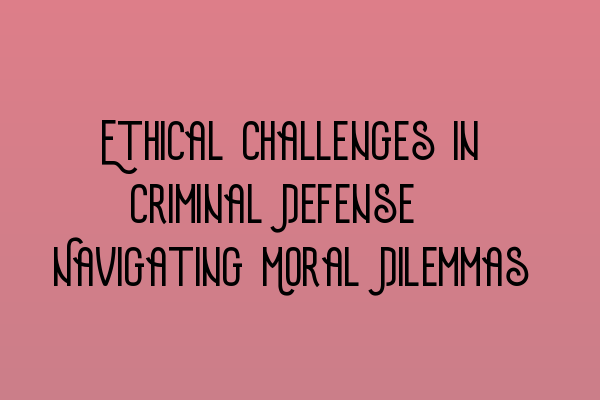Ethical Challenges in Criminal Defense: Navigating Moral Dilemmas
Welcome to the SQE Criminal Law & Practice Law UK blog! In today’s post, we will be discussing the ethical challenges faced by criminal defense solicitors and the importance of navigating moral dilemmas in the legal profession.
The Role of a Criminal Defense Solicitor
As a criminal defense solicitor, your primary duty is to provide competent representation to your clients while upholding the core ethical principles of the legal profession. You are tasked with protecting the rights and interests of individuals accused of criminal offenses, ensuring their fair treatment in the criminal justice system.
However, the nature of criminal defense work often presents various moral dilemmas that require careful consideration and navigation. Let’s explore some of the common ethical challenges faced by criminal defense solicitors.
Presumption of Innocence
One of the fundamental principles of criminal law is the presumption of innocence. Every individual accused of a crime is presumed innocent until proven guilty. As a defense solicitor, your duty is to vigorously advocate for your client’s innocence and challenge the prosecution’s evidence. This can be a challenging task, especially when faced with overwhelming evidence against your client.
It is essential to remember that our legal system depends on the adversarial process, where both sides present their arguments. By fulfilling your duty to defend your client, you are ensuring the proper functioning of justice and safeguarding the principle of innocence until proven guilty.
Confidentiality and Privilege
Confidentiality and legal privilege are crucial aspects of the attorney-client relationship. Clients must be able to trust their solicitors with sensitive and confidential information without fear of it being used against them. However, this can lead to ethical dilemmas when faced with potentially harmful information that could impact the defense’s strategy.
As a criminal defense solicitor, you must balance your duty of confidentiality with your obligation to act in the best interests of justice. It is your responsibility to guide your client through the legal process, ensuring they understand the implications of their decisions while maintaining their trust and confidence in you.
Zealous Representation vs. Professional Conduct
Advocacy plays a vital role in criminal defense, but it must be balanced with professional conduct and ethical obligations. While it is essential to vigorously represent your client’s interests, it is equally important to ensure that your conduct remains within the bounds of the law and professional ethics.
There may be situations where you face conflicting duties, such as when your client’s interests may be better served by engaging in questionable tactics or presenting false evidence. It is your responsibility as a solicitor to provide honest and accurate advice while maintaining the integrity of the legal profession.
Conclusion
Being a criminal defense solicitor comes with its fair share of ethical challenges. Navigating moral dilemmas requires a deep understanding of the law, vigilant adherence to ethical standards, and a commitment to upholding justice.
If you’re interested in furthering your knowledge in criminal law and preparing for the SQE exams, check out our related articles:
- SQE 1 Practice Exam Questions
- SQE 1 Practice Mocks FLK1 FLK2
- SQE 2 Preparation Courses
- SQE 1 Preparation Courses
- SRA SQE Exam Dates
Stay tuned for more informative articles about criminal law and practice in the UK. If you have any questions or would like to learn more about our SQE preparation courses, feel free to contact us.
Disclaimer: This article is for informational purposes only and should not be considered legal advice. Consult a qualified solicitor for legal guidance specific to your case.
